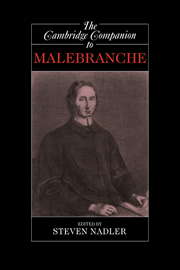Book contents
- Frontmatter
- Introduction
- 1 Malebranche and Method
- 2 Malebranche on the Soul
- 3 Malebranche on Ideas and the Vision in God
- 4 The Malebranche-Arnauld Debate
- 5 Malebranche on Causation
- 6 Metaphysics and Philosophy
- 7 Malebranche's Theodicy
- 8 Malebranche on Human Freedom
- 9 Malebranche's Moral Philosophy
- 10 The Critical Reception of Malebranche, from His Own Time to the End of the Eighteenth Century
- 11 Malebranche's Life and Legacy
- Bibliography
- Index
9 - Malebranche's Moral Philosophy
Divine and Human Justice
Published online by Cambridge University Press: 28 May 2006
- Frontmatter
- Introduction
- 1 Malebranche and Method
- 2 Malebranche on the Soul
- 3 Malebranche on Ideas and the Vision in God
- 4 The Malebranche-Arnauld Debate
- 5 Malebranche on Causation
- 6 Metaphysics and Philosophy
- 7 Malebranche's Theodicy
- 8 Malebranche on Human Freedom
- 9 Malebranche's Moral Philosophy
- 10 The Critical Reception of Malebranche, from His Own Time to the End of the Eighteenth Century
- 11 Malebranche's Life and Legacy
- Bibliography
- Index
Summary
INTRODUCTION
Given the radical theocentrism of Malebranche's philosophy-in which God is the only “true” good and “true” cause, in which “we see all things in God,” in which God “moves our arm” on the occasion of our willing it, in which existence is only “continual creation” by God, and in which nature is “nothing but the general laws which God has established” (TNG, Ist Illustration, iii, OC 5:148; R 196)-it is to be expected that a theodicy (“the justice of God”) will be the central and governing moral-political notion, in an almost Leibnizian way, and that this quasi-Theodicée will then shape (say) the meaning of Christian love, the Pauline notion that “the greatest of these is charity” (I Corinthians xiii). This expectation is borne out: For Malebranche a “love of union” should be reserved for God alone (the true good, the true cause) while finite creatures should receive only a “love of benevolence.” As he says in the Traité de morale,
The word love is equivocal, and therefore we must take care of it ... [we must] love none but God with a love of union or conjunction, because he alone is the cause of our happiness ... we must love our neighbor not as our good, or the cause of our happiness, but only as capable of enjoying the same happiness with us ...
We may join ourselves to other men; but we must never adore them within the motion of our love, either as our good, or as capable of procuring us any good; we must love and fear only the true cause of good and evil; we must love and fear one but God in the creatures ... The creatures are all particular beings, and therefore cannot be one general and common good. (Morale II, 6, vi, OC 11:195)
- Type
- Chapter
- Information
- The Cambridge Companion to Malebranche , pp. 220 - 261Publisher: Cambridge University PressPrint publication year: 2000
- 5
- Cited by

